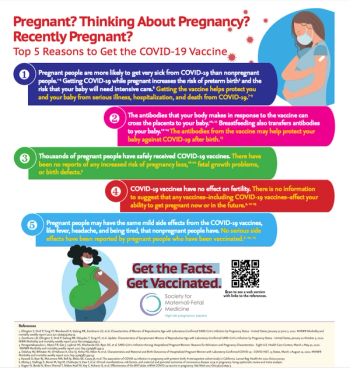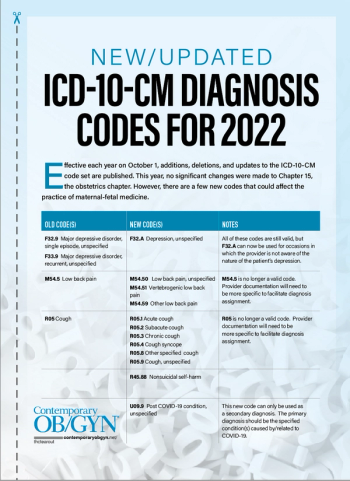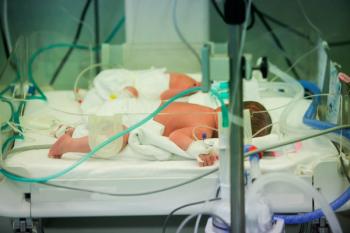
Because the treatment options for imminent extreme premature labor center largely on patient preference, decision aids (DA) can help facilitate the patient-provider discussion and guide the shared decision-making process.


Because the treatment options for imminent extreme premature labor center largely on patient preference, decision aids (DA) can help facilitate the patient-provider discussion and guide the shared decision-making process.

Get the Facts. Get Vaccinated.

Experts evaluate 3 clinical scenarios and determine the appropriate course of action.

Effective each year on October 1, additions, deletions, and updates to the ICD-10-CM code set are published. This year, no significant changes were made to Chapter 15, the obstetrics chapter. However, there are a few new codes that could affect the practice of maternal-fetal medicine.

A review and meta-analysis in JAMA Network Open revealed women exposed to marijuana in pregnancy were at significantly increased risk for adverse neonatal outcomes, including low birth weight, small for gestational age, and preterm delivery.

An oral concurrent session at SMFM’s 42nd Annual Pregnancy Meeting highlighted an analysis of pregnancy outcomes after optimal prenatal opioid use disorder care.

An oral presentation at the Society for Maternal-Fetal Medicine’s (SMFM) 42nd Annual Pregnancy Meeting explored possible associations with marijuana use and nausea and vomiting in early pregnancy.

At the Society for Maternal-Fetal Medicine’s 42nd Annual Meeting, a roundtable discussion explored ways to promote inclusivity and support transgender and gender-expansive individuals in the women’s health space.

Researchers presented their oral abstract on the association between lactation and the gut microbiome during the SMFM 42nd Annual Pregnancy Meeting.

Protocol 5 - In this protocol, Norton reviews the pathophysiology of fetal aneuploidy and the wide range of tests for it. Included are perspectives on cell-free DNA testing, first-trimester combined screening, nuchal translucency (NT) sonography, and pregnancy-associated plasma protein A (PAPP-A) and human chorionic gonadotropin (hCG), as well as quad marker screening in the second trimester in appropriate cases, and combined first- and second-trimester screening.

These results suggest that maternal diet during pregnancy can significantly affect obesity risk in children.

Eating disorders carry many risks. An investigation looks into whether they can increase the risk of certain neurodevelopmental conditions in the children of mothers with a history of eating disorders.

Scientific advances have led to more extremely preterm infants surviving delivery. What are the outcomes for these infants?

Additionally, the study showed a 15-fold increase in maternal mortality rates associated with chronic hypertension over the 40-year study period.

These mothers are approximately 17% less likely to die from cardiovascular disease, 14% less likely to develop coronary heart disease, and 12% less likely to suffer a stroke, the data show.

Because many groups have a stake in newborn screening, “Who will take responsibility for integrating varying perspectives to modernize newborn screening?” Bailey pondered. “Funding and auspice will be critical decisions.”

Maneesh Jain, CEO and co-founder of Mirvie, a proprietary RNA platform that uses blood samples to predict pregnancy complications such as preeclampsia, sits down with Contemporary OB/GYN to discuss the potential of the test.

Often based on racial/ethnic, socioeconomic, and age-based assumptions

Recommendations for maternity care professionals based on MiPATH.

“The results suggested that weight maintenance or weight loss should not be used as routine guidelines,” The authors concluded.

Together, the American College of Obstetrics & Gynecologists (ACOG) and the University of Michigan developed MiPATH recommendations (Michigan Plan for Appropriate Tailored Healthcare) to create comprehensive, tailored prenatal care plans for patients.

An experimental blood test uses plasma cell-free RNA (cfRNA) to accurately predict preeclampsia as early as 16 weeks

A cross-sectional analysis of the Boston Birth Cohort (BBC) from 1998 to 2016 has found that maternal nativity and duration of United States residence were linked to preeclampsia among non-Hispanic Black women, but not among Hispanic and non-Hispanic White women, after adjusting for sociodemographic and cardiovascular risk factors.

The use of hair dyes, bleach, relaxers, and mousse was associated with lower levels of sex steroid hormones in pregnant women, according to a new Rutgers study.

A new national survey reveals the pressing need for better maternal mental health planning.